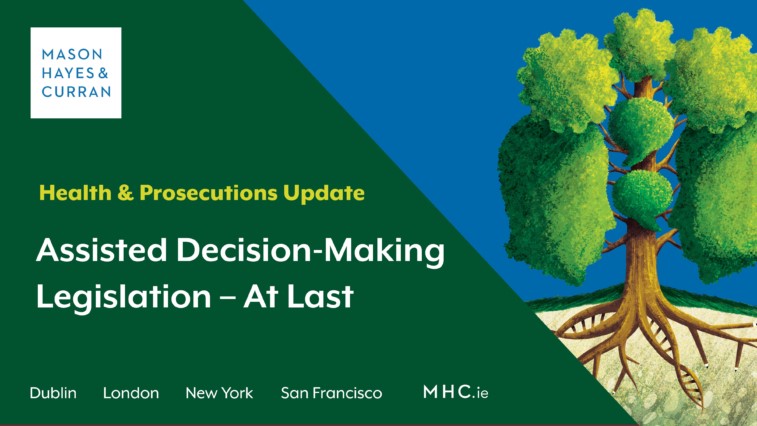Assisted Decision-Making Legislation – At Last

The Assisted Decision-Making (Capacity) Act provides for a new structure of assisted decision making. There have been sizeable challenges to introduce the underlying framework since the legislation was signed into law in 2015. It now seems that the previously signalled commencement date of mid-2022 may be a reality, following a recent announcement from Government.
New Bill
Late last year, Cabinet approved the preparation of the Assisted Decision-Making (Capacity) (Amendment) Bill 2021. This Bill makes some amendments to the decision-making processes necessary to commence of the 2015 Act. Additional measures in the Bill, include a commitment to at least 6% of employment of persons with disabilities within the public sector.
Timeline
A completion date of June 2022 for the legislative provisions has been identified by Government, with the Decision Support Service (DSS) to be fully operational by July 2022. It is intended to transition existing Wards out of the wardship within three years.
Call for submissions
The Joint Committee on Children, Equality, Disability, Integration and Youth has issued a call for submissions, including from the solicitors’ profession. The deadline for submissions was extended to 21 January 2022. The Committee has been asked to prioritise its pre-legislative scrutiny process in light of the summer deadline.
New wardship applications
The High Court continues to hear new Ward of Court applications for now, but it is not inconceivable that non-urgent applications may not be accepted as the commencement date draws nearer.
Circuit Court
Once the assisted-decision making legislation is commenced, the Circuit Court will be the main venue for capacity decisions. Considering that many courts are facing lengthy delays arising from COVID-19 disruption, it remains to be seen what additional resources will be required in the wake of the conferral of this significant new jurisdiction on the Circuit Court.
Conclusion
2022 is shaping up to be a transformative year for the legal structures designed to protect vulnerable adults. A significant amount of preparation has been underway by the DSS to lay the administrative foundation for this system, and all eyes are now on Government to ensure an efficient conclusion to the outstanding legislative provisions.
If you deal with wardship cases within your profession and would like to know more about how specific cases will be affected, please contact a member of our Health & Prosecutions team.
The content of this article is provided for information purposes only and does not constitute legal or other advice.
Share this:


